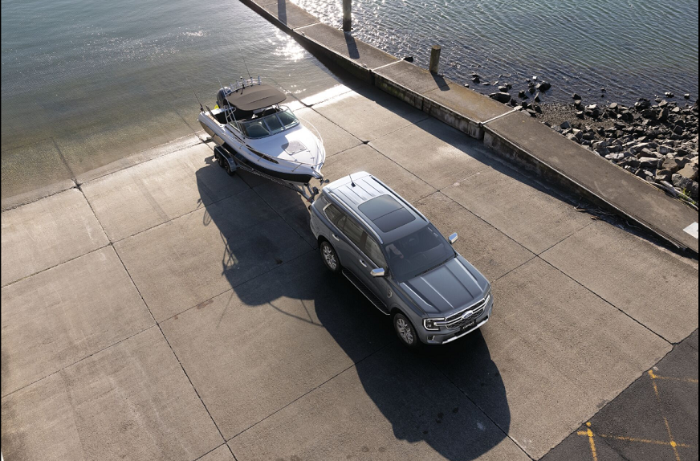For adventurers who need to tow, the Ford Next-Gen Ford Everest ’s rugged capability, innovative technologies and smart safety features make hitching and hauling easier, safer, and more convenient than ever.
Next-Gen Ford Everest’s go-anywhere capabilities and class-leading 3.1T towing capacity mean owners can take everything they need to make their next adventure epic. And, with more towing technology on hand to make light work of lugging heavy loads, owners can spend more time exploring the great outdoors with confidence.
“As temperatures drop across the Middle East, we’re now enjoying the perfect weather for all things outdoor,” said Andrew Gregory, Brand Marketing Manager for Everest at Ford Middle East.
“Equipped with a suite of technology-enabled safety and convenience features, the Next-Gen Ford Everest has been engineered to give adventurers the tools they need for all kinds of excursion. Whether you’re pulling a speedboat to the seaside or dragging your dune buggy to the desert, the Everest gives your gear true go-anywhere capability.”
Hitching made easy
Regardless of experience, hitching a tow vehicle and trailer can be tricky – and often stressful – if others are watching and waiting. Whether alone or with a spotter, lining up to hitch a trailer can be a tension-filled ordeal, trying to perfectly position the tow ball under the trailer hitch receiver.
Next-Gen Ford Everest makes hitching simple. The 360-degree camera’s top-down view helps guide the Next-Gen Ford Everest close to the trailer, while a reverse view with dynamic lines and distance guides helps line up the tow ball and receiver. For ultimate pinpoint accuracy, the hitch view button provides a bird’s-eye view of the tow ball and receiver.
Checking everything
Next-Gen Ford Everest ’s trailer connection checklist provides a handy step-by-step reference guide for towing novices and seasoned pros. Integrated into the SYNC system; it walks owners through the steps required to safely connect the trailer before setting off. Owners can also check that their trailer lights are working without the need for a spotter by pressing a button on the SYNC screen. The system will run a test pattern of the taillamps, brake lights and indicator lights, cycling through the pattern five times, to give owners plenty of time to confirm everything is working properly before setting off.
Confidence on the move
Hauling a trailer for the first time can be intimidating – but Next-Gen Ford Everest ’s capability and safety features are designed to make towing a little easier.
The dedicated Tow/Haul drive mode ensures Next-Gen Ford Everest provides the best balance of power and control for the driver. It holds gears longer to help maintain power delivery when needed and will help provide engine braking when driving in hilly areas. It also increases resistance on the steering wheel for better control and comfort.
For more confidence when braking, Next-Gen Ford Everest comes fitted with a trailer brake controller, which works with the electric brakes on the trailer. It adapts its output based on Next-Gen Ford Everest’s brake pressure, working with the anti-lock brake system (ABS) to compensate for changing traction conditions, reducing the risk of trailer brake lockup under heavy or sudden braking.
Trailer Sway Control
Next-Gen Ford Everest’s innovative new trailer sway control is another piece of technology that works away in the background to help owners tow with more confidence.
The system works with Next-Gen Ford Everest ’s electronic stability control system to monitor performance while towing. If the trailer begins to sway from side to side, the system will warn the driver to slow down and, if necessary, apply brake pressure to individual wheels on the Next-Gen Ford Everest – and apply the trailer brakes – to eliminate the issue. It will even reduce engine power to help the driver regain control.
BLIS with trailer coverage
For added peace of mind and safer driving, Ford’s blind spot information system (BLIS) now includes coverage, helping you to change lanes with more confidence. The system is designed to work with trailers up to 2.4 metres wide and up to 10 metres long (from the rear of your Next-Gen Ford Everest). BLIS uses radar sensors to monitor adjacent lanes for vehicles and inform you of any hazards. You’ll need to create a profile for your trailer by following the prompts on the SYNC touchscreen.


COMMENTS